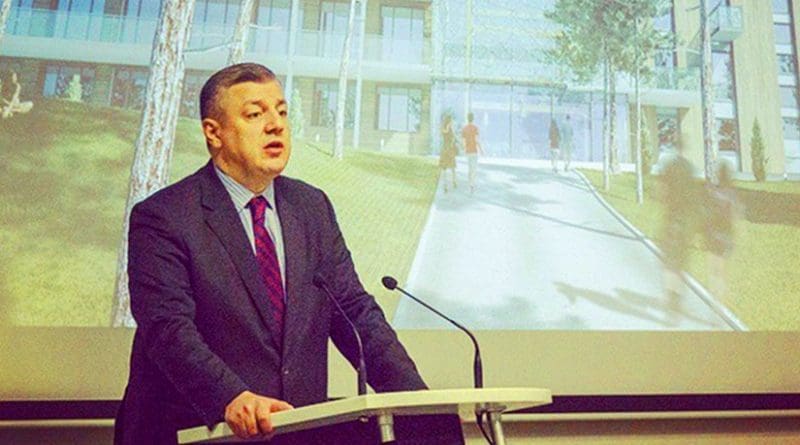Georgia’s Ruling Party Selects Kvirikashvili As New Prime Minister
By RFE RL
By Liz Fuller
(RFE/RL) — Zviad Kvachantiradze, who heads the Georgian parliament’s majority Georgian Dream (GD) faction, announced at a meeting of faction members on December 25 that agreement was reached during talks the previous day on nominating current Foreign Minister Giorgi Kvirikashvili as the country’s new prime minister.Irakli Garibashvili announced his resignation from that post late on December 23 without specifying his reasons for doing so.
In line with the Georgian constitution, President Giorgi Margvelashvili must ask the parliament to approve Kvirikashvili’s candidacy, for which a minimum of 75 votes is necessary. The various parties aligned in the GD coalition control 87 seats.
Kvirikashvili, Garibashvili, and parliament speaker Davit Usupashvili arrived together for the faction meeting on December 25 and were met with a round of applause.
Kvirikashvili, 48, was named foreign minister on September 1 despite his lack of any relevant experience. He holds degrees in medicine and economics and has spent most of his career in finance and banking. He was elected to parliament in 1999 on the ticket of the opposition New Rightists party, then from 2006 to 2011 he served as general director of billionaire philanthropist Bidzina Ivanishvili’s Cartu Bank. Following the victory of Ivanishvili’s Georgian Dream coalition in the October 2012 parliamentary elections, Kvirikashvili was named economy minister.
Asked by journalists to explain the choice of Kvirikashvili as Garibashvili’s successor, senior GD law-maker Gia Volsky replied “he is a member of the Georgian Dream political family and has good data.”
Those opposition politicians, primarily but not exclusively from the former ruling United National Movement (ENM), who long regarded Garibashvili as little more than a puppet in Ivanishvili’s hands, are likely to construe the choice of a former close Ivanishvili associate for prime minister as corroborating that conviction.
According to speaker Usupashvili, the parliament will consider the composition of the new cabinet on December 28-29. Kvirikashvili said today there will be “no significant, dramatic changes.” Finance Minister Nodar Khaduri, Health Minister David Sergienko, and Minister for Reconciliation and Civic Equality Paata Zakareishvili are reportedly at risk of losing their posts.
Insofar as GD’s failure to deliver on its pre-election promises to speed up economic growth and reduce unemployment is one of the main factors behind its loss of popular support over the past year, the choice of a competent economist to head the government is logical. Whether Kvirikashvili can deliver the hoped-for economic upswing in time to reverse that trend in the run-up to the parliamentary elections due in October remains to be seen, however.
Speaking at a press conference on December 23, just hours before Garibashvili announced his resignation, ENM parliamentarian Zurab Chiaberashvili said the current government “has no vision of how to improve the economy.” Chiaberashvili specifically called for the abolition of the profit tax in order to lighten the burden on business and help create new jobs.
A second ENM law-maker, Giorgi Gabashvili, opined that Garibashvili’s resignation shows the current leadership is aware “what a catastrophe the country is facing.” At the same time, he predicted that “nothing will change until Ivanishvili distances himself” from the workings of the government.

